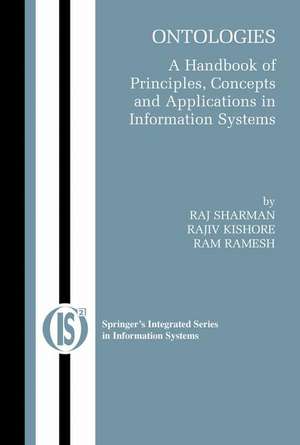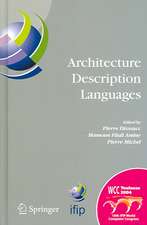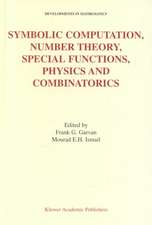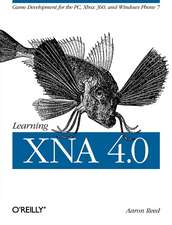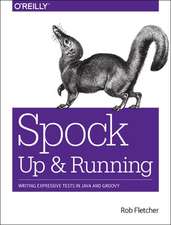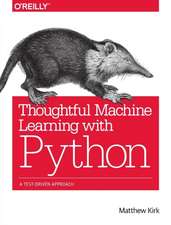Ontologies: A Handbook of Principles, Concepts and Applications in Information Systems: Integrated Series in Information Systems, cartea 14
Editat de Rajiv Kishore, Ram Rameshen Limba Engleză Hardback – 18 dec 2006
| Toate formatele și edițiile | Preț | Express |
|---|---|---|
| Paperback (1) | 1474.68 lei 6-8 săpt. | |
| Springer Us – 23 aug 2016 | 1474.68 lei 6-8 săpt. | |
| Hardback (1) | 1933.71 lei 6-8 săpt. | |
| Springer Us – 18 dec 2006 | 1933.71 lei 6-8 săpt. |
Din seria Integrated Series in Information Systems
- 15%
 Preț: 646.62 lei
Preț: 646.62 lei - 20%
 Preț: 996.07 lei
Preț: 996.07 lei - 20%
 Preț: 1272.94 lei
Preț: 1272.94 lei -
 Preț: 389.11 lei
Preț: 389.11 lei - 20%
 Preț: 998.04 lei
Preț: 998.04 lei - 15%
 Preț: 654.43 lei
Preț: 654.43 lei -
 Preț: 388.52 lei
Preț: 388.52 lei - 15%
 Preț: 646.11 lei
Preț: 646.11 lei - 15%
 Preț: 667.71 lei
Preț: 667.71 lei - 15%
 Preț: 711.89 lei
Preț: 711.89 lei -
 Preț: 393.52 lei
Preț: 393.52 lei - 15%
 Preț: 644.82 lei
Preț: 644.82 lei - 18%
 Preț: 955.25 lei
Preț: 955.25 lei - 5%
 Preț: 1280.25 lei
Preț: 1280.25 lei - 15%
 Preț: 586.55 lei
Preț: 586.55 lei - 15%
 Preț: 638.11 lei
Preț: 638.11 lei - 20%
 Preț: 1277.24 lei
Preț: 1277.24 lei - 20%
 Preț: 1215.12 lei
Preț: 1215.12 lei - 20%
 Preț: 638.37 lei
Preț: 638.37 lei - 5%
 Preț: 1801.57 lei
Preț: 1801.57 lei - 18%
 Preț: 952.72 lei
Preț: 952.72 lei - 15%
 Preț: 653.14 lei
Preț: 653.14 lei - 20%
 Preț: 995.75 lei
Preț: 995.75 lei - 20%
 Preț: 649.28 lei
Preț: 649.28 lei
Preț: 1933.71 lei
Preț vechi: 2417.14 lei
-20% Nou
Puncte Express: 2901
Preț estimativ în valută:
370.02€ • 381.73$ • 308.78£
370.02€ • 381.73$ • 308.78£
Carte tipărită la comandă
Livrare economică 26 martie-09 aprilie
Preluare comenzi: 021 569.72.76
Specificații
ISBN-13: 9780387370194
ISBN-10: 0387370196
Pagini: 930
Ilustrații: XIX, 930 p.
Dimensiuni: 155 x 235 x 48 mm
Greutate: 1.41 kg
Ediția:2007
Editura: Springer Us
Colecția Springer
Seria Integrated Series in Information Systems
Locul publicării:New York, NY, United States
ISBN-10: 0387370196
Pagini: 930
Ilustrații: XIX, 930 p.
Dimensiuni: 155 x 235 x 48 mm
Greutate: 1.41 kg
Ediția:2007
Editura: Springer Us
Colecția Springer
Seria Integrated Series in Information Systems
Locul publicării:New York, NY, United States
Public țintă
ResearchCuprins
Foundations of ODIS.- The Road Toward Ontologies.- Use of Ontologies for Organizational Knowledge Management and Knowledge Management Systems.- Ontological Evaluation of Business Models: Comparing Traditional and Component-Based Paradigms in Information Systems Re-Engineering.- Using Ontologies in the Semantic Web: A Survey.- Positivism or Non-Positivism — Tertium Non Datur.- Ontology, Life-World, and Responsibility in IS.- Ontological Engineering.- An Ontological Approach to Develop Knowledge Intensive CBR Systems.- MDA Standards for Ontology Development.- Ontology Specification and Integration for Multimedia Applications.- Ontology Revision.- Modeling and Reasoning About Changes in Ontology Time Series.- Machine Learning-Based Maintenance of Domain-Specific Application Ontologies.- MnM: Semi-Automatic Ontology Population from Text.- An Ontological Approach to Requirements Elicitation Technique Selection.- ODIS Architectures.- Use of Ontology for Automating Knowledge Intensive Business Processes.- Using Ontologies to Create Object Model for Object-Oriented Software Engineering.- An Ontology-Based Exploration of Knowledge Systems for Metaphor.- The Knowledge Collective Framework Makes Ontology Based Information Accessible, Maintainable, and Reusable.- Information Systems Aspects and the Ontology of Hypermedia Systems.- Ontology-Enabled Database Management Systems.- Enhancing Interoperability and Web Services Standards Through Ontological Analysis.- Context-Aware Ontology Selection Framework.- Ontology-Based User Modeling.- Ontology-Based User Profiles for Personalized Search.- ODIS Applications.- Ontology-Driven Information System for Supply Chain Management.- Framework for Enhanced Interoperability.- Foundations for a Core Ontology of Manufacturing.- Engineering aDevelopment Platform for Ontology-Enhanced Knowledge Applications.- Inductive Design and Testing of a Performance Ontology for Mobile Emergency Medical Services.- Development of an Ontology-Based Smart Card System Reference Architecture.- Using Ontologies in Mobile Surveyor.- The News Ontology for Professional Journalism Applications.
Textul de pe ultima copertă
It is now being recognized that ontological principles can be fruitfully applied to and developed further in various fields within the broader information systems area. This development has lead to ontology-driven information systems (ODIS), which is a concept that can open up new ways of thinking about ontologies and the Information Systems — both structurally and temporally.
The primary objective of ONTOLOGIES: A Handbook of Principles, Concepts and Applications in Information Systems is to mobilize a collective awareness in the research community to the leading and emerging developments in ODIS, and consequently, highlight the enormous potential of ODIS research to both fundamentally transform and create innovative solutions to several problems in various domains. This book is a compilation of 32 leading-edge chapter contributions from some of the top researchers in the community working in various fundamental and applied disciplines related to ODIS. These chapters are organized into four broad themes: Foundations of ODIS, Ontological Engineering, ODIS Architectures, and ODIS Applications. These four themes together describe the state-of-the-art in ODIS and give a complete perspective on the problems, solutions and open research questions in this field. The foundations of ODIS are addressed in Chapters 1-6. The principles and techniques of ontological engineering in the context of ODIS are covered in Chapters 7-14. A collection of ODIS architectures in a variety of contexts is presented in Chapters 15-24, and lastly, a set of important and emerging ODIS applications is presented in Chapters 25-32.
We expect this book to trigger innovative thought processes that will open up significant new domains in ODIS research. Numerous open research questions, challenges and opportunities can be found throughout this book and we hope this will stimulate significantresearch over the years.
The primary objective of ONTOLOGIES: A Handbook of Principles, Concepts and Applications in Information Systems is to mobilize a collective awareness in the research community to the leading and emerging developments in ODIS, and consequently, highlight the enormous potential of ODIS research to both fundamentally transform and create innovative solutions to several problems in various domains. This book is a compilation of 32 leading-edge chapter contributions from some of the top researchers in the community working in various fundamental and applied disciplines related to ODIS. These chapters are organized into four broad themes: Foundations of ODIS, Ontological Engineering, ODIS Architectures, and ODIS Applications. These four themes together describe the state-of-the-art in ODIS and give a complete perspective on the problems, solutions and open research questions in this field. The foundations of ODIS are addressed in Chapters 1-6. The principles and techniques of ontological engineering in the context of ODIS are covered in Chapters 7-14. A collection of ODIS architectures in a variety of contexts is presented in Chapters 15-24, and lastly, a set of important and emerging ODIS applications is presented in Chapters 25-32.
We expect this book to trigger innovative thought processes that will open up significant new domains in ODIS research. Numerous open research questions, challenges and opportunities can be found throughout this book and we hope this will stimulate significantresearch over the years.
Caracteristici
Provides a comprehensive understanding of ontologies in the context of information systems. It will provide the reader with not only introductory material to the subject, but also introduces techniques for ontology engineering A research volume in that it represents new content and research issues that have not been published elsewhere Growing recognition that ontological principles and concepts need not be restricted to the traditional domains of knowledge inquiry, and can be fruitfully applied to and developed further in various fields within the broader information systems area Includes supplementary material: sn.pub/extras
